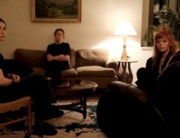
We begin in a 17-century British town called Seaside, which is, we find out, nowhere near the sea. It is misty, remote, somewhere in the mountains, and vaguely medieval—and encircled by mysterious woods. Its townspeople are bawdy and suspicious and have made a practice of stoning to death female residents, whose crimes have been fabricated, on what they happily call “stoning day.” They also turn out for the elaborate, masterful puppet shows put on by none other than Punch (Damon Herriman) and Judy (Mia Wasikowska), though they neglect to pay the two much for their efforts. The production is, like the traditional Punch and Judy show, violent, mostly at Judy’s expense, and the crowd loves it.
Punch is the acknowledged puppet master, but it is really Judy who pulls the strings. She is fed up with his drinking, his neglect of their baby daughter, and tells him that he needs to get his act together if they are to actually tour the bigger towns. It is an understatement to say that he does none of these things, and a tragic accident forces Judy to hide in the woods among a strange coven and leaves Punch to pick up the pieces of her absence. By the end, she is pitted against him and the cruel culture of the town.
The debut feature from Mirrah Foulkes is nothing if not beautifully designed and inhabited with aplomb by a deeply committed cast. Its world is tangible, evoked with great specificity of detail in the production design. We can almost smell the mist along with the filth that the inhabitants of Seaside live in. The script walks a sometimes uneasy line between genuine darkness and a Monty Python–esque embrace of anachronism and the bizarre, but it is handled with ease by all cast members.
Wasikowska, as the stern, kind, justly angry Judy, is probably the standout, and she has proved herself over the years as an actor to watch. While I am much more devoted to some of her projects (Jane Eyre, Only Lovers Left Alive, The Kids Are All Right) than others (Damsel), it is nevertheless clear that she chooses projects in which directors have unusual visions.
Yet I have to confess that the previously mentioned tragic event was, to my eyes, tasteless, poorly handled, and pointless. Other viewers may feel differently, I’m sure. As it occurred only 30 minutes into the film, Judy & Punch had an uphill battle to fight its way back into my affections. It did not succeed.
Foulkes attempts to create an unusual environment, but it is so obvious what the characters and events stand for (the angry, misogynist mob/the exiled feminists in the woods) that the story actually feels quite banal. For the most part, there is little to nothing unexpected, and the film suffers from the simplicity of its message. While it is certainly well-timed in its subject matter, and the legacy of Punch and Judy shows is theoretically an excellent vehicle for exploring the entertainment industry’s history of sexism, the movie does not go much farther than to tell us what we already know. Other works of film and TV (Top of the Lake, Mustang, Atlantics, Fish Tank, The Holy Girl, A Girl Walks Home Alone at Night and many others) use an understanding of sexism and toxic masculinity as a stepping stone to move further into an embrace of contradiction, a genuine exploration of the issues at hand, and the creation of a world which, whether realistic or not, feels as complex as the one we inhabit off-screen.
Many viewers will find it a satisfying revenge story, and there is always a place for the simple gratification of justified vengeance. In that sense, Judy & Punch delivers.






Leave A Comment